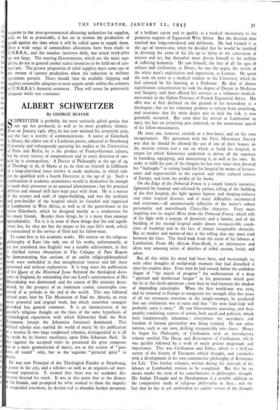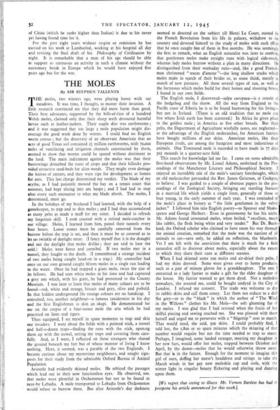ALBERT SCHWEITZER
By GEORGE SEAVER
SCHWEITZER is probably the most variously gifted genius that our age has produced, as well as its most prophetic thinker. Born on January 14th, 1875, he has now attained his seventieth year, and the fact is worthy of commemoration. A native of Gunsbach in Alsace, the eldest son of a Lutheran pastor, educated at Strasbourg University and subsequently pursuing his studies at the Universities of Paris and Berlin, he is the product of Franco-German culture, but by every instinct of temperament and in every direction of out- look he is cosmopolitan. A Doctor of Philosophy at the age of 24, of Theology at 26, of Music at 31, he then set himself in fulfilment of a long-cherished inner resolve to study medicine, in which sub- ject he qualified with a fourth Doctorate at the age of 35. Such a combination of academic attainments would in themselves be enough to mark their possessor as an unusual phenomenon ; but his practical abilities and manual skill have kept pace with them. He is a master of the science and craft of organ-building, and was the architect and part-builder of the hospital which he founded and organised at Lambarene in West Africa, as well as of the guest-house in his native Giinsbach, which he designed mainly as a rendezvous for his many friends. Besides these things, he is a more than amateur agriculturalist. Yet it is in none of these things that his real signifi- cance lies, for they are but the means to his true life's work, which is consecrated to the service of God and his fellow-men.
To come first to his academic works. His treatise on the religious philosophy of Kant (the only one of his works, unfortunately, as yet not translated into English) was a notable achievement, in that it clarified certain obscurities in The Critique of , Pure Reason by demonstrating that sections of an earlier religio-philosophical work were embedded in that metaphysical treatise and left there unrevised and without explanation. It is long since the publication of his Quest of the Historical Jesus fluttered the theological dove- cotes in England, by contending that our Lord's consciousness of His Messiahship was dominated, and the course of His ministry deter- mined, by the prospect of an imminent cosmic catastrophe con- eived of as prelude to the end of the world. This was followed everal years later by The Mysticism of Paul the Apostle, an even ore powerful and original work, but which somewhat strangely rovoked less general comment. It is an interpretation of the postle's religious thought on the lines of the same hypothesis of chatological expectation with which Schweitzer finds the New estament (except the Johannine literature) dominated. This iblical scholar next startled the world of music by his publication f a treatise in two large condensed volumes, distinguished as is all is work by_its literary excellence, upon John Sebastian Bach. In is (against the accepted view) he presented the great composer of as a mere geometrician of music, not as the creator of " pure Ines of sound " only, but as the 'supreme " pictorial artist " in usic.
He was now Principal of the Theological Faculty at Strasbourg, pastor in the city, and a scholar—as well as an organist—of inter- ational reputation. It seemed that there was no academic dis- inction beyond his reach. It was at this point that to the dismay his friends, and prompted by what seemed to them the impulse f misguided sentiment, he determ'ned to abandon further prospects
of a brilliant career and to qualify as a medical missionary to the primitive negroes of Equatorial West Africa. But the decision thus reached was long-considered and deliberate. He had formed it at the age of twenty-one, when he decided that he would be justified in devoting the years of his life up to thirty to the cultivation of science and art, but thereafter must devote himself to the welfare of suffering humanity. He saw himself, the heir of all the ages of culture and civilization, as Dives ; he saw the negro, the victim of the white man's exploitation and oppression, as Lazarus. He spent the next six years as a medical student in the University which he had adorned by his learning as a Professor. By dint of almost superhuman concentration he took the degree of Doctor in Medicine and Surgery, and then offered his services as a volunteer medical- missionary in the Gabon Province of French Equatorial Africa. His offer was at first declined on the ground of his heterodoxy as a theologian ; but on his voluntary promise to refrain from preaching, and assurance that his main desire was to heal the sick, it was gratefully accepted. But soon after his arrival at Lambarene in 1913, the ban on preaching was removed, on the unanimous appeal of his fellow-missionaries.
He went out, however, entirely as a free-lance, and on his own recognizances. His agreement with the Paris Missionary Society was that he should be allowed the use of one of their houses on the mission station and a site on which to build his hospital, in return for which Schweitzer undertook to defray all the expenses in founding, equipping, and maintaining it, as well as his own. In order to fulfil his part of the bargain he has ever since then devoted his " furloughs " to raising funds for his hospital by means of lecture- tours and organ-recitals in the capitals and other cultural centres of Europe, and from the profits of his books.
On the Edge of the Primeval Forest is a simple homely narrative, lightened by humour and softened by pathos, telling of the building of the first hospital, the fight against leprosy and sleeping-sickness and other tropical diseases, and of many difficulties encountered and overcome,—all unconsciously reflective of the writer's robust personality and marvellously Christ-like character. Even more inspiring was its sequel More from the Primeval Forest, which tells of his fight with a scourge of dysentery and a famine, and of the building of the second hospital under almost inconceivable condi- tions of hardship and in the face of almost insuperable obstacles. But so modest and matter-of-fact is the telling that one must read between the lines. The third book from the scene of his labours at Lambarene, From My African Note-Book, is an informative and often very amusing series of sketches of tribal custom, fetish, and taboo.
But all this while his mind had been busy, and increasingly so, with other thoughts of world-wide moment that had disturbed it since his student days. Even then he had sensed, below the confident slogan of " the march of progress " the undercurrent of a deep " spiritual and intellectual fatigue " in his generation which gave the lie to this facile optimism ; even then he had foreseen the shadow of impending catastrophe. When the first world-war was over, and he returned to Europe to recuperate his strength after five years of all too strenuous exertions in the jungle-swamps, he predicted that our civilization was in ruins and that " the next land-slide will probably carry it away." He saw Governments pursuing, and their peoples condoning, courses of action, both social and political, which were fundamentally inhumane ; everywhere the sacredness and freedom of human personality was being violated. He saw other nations, such as our own, drifting irresponsibly into chaos. Hence
he began his Philosophy of Civilization with an introductory volume entitled The Decay and Restoration of Civilization, wh:ch was quickly followed by a work of much greater magnitude and importance. This was Civilization and Ethics, which is a brilliant
survey of the history of European ethical thought, and concludes with a development of his own constructive philosophy of Reverence for Life. Two further volumes, written during the intervals of his labours at Lambarene, remain to be completed. But this by no means marks the term of his contributions to philosophic thought.
His Indian Thought and its Development is a notable addition to the comparative study of religious philosophy in Asia ; and the fact that he has as yet undertaken no similar survey of the thought
of China (which he ranks higher than Indian) is due to his never yet having found time for it.
For the past eight years without respite or remission he has carried on his work at Lambarene, working at his hospital all day and revising the final draft of his Philosophy of Civilization by night. It is remarkable that a man of his age should be able to support so strenuous an activity in such a climate without the customary break in Europe which he would have enjoyed five years ago but for the war.























 Previous page
Previous page